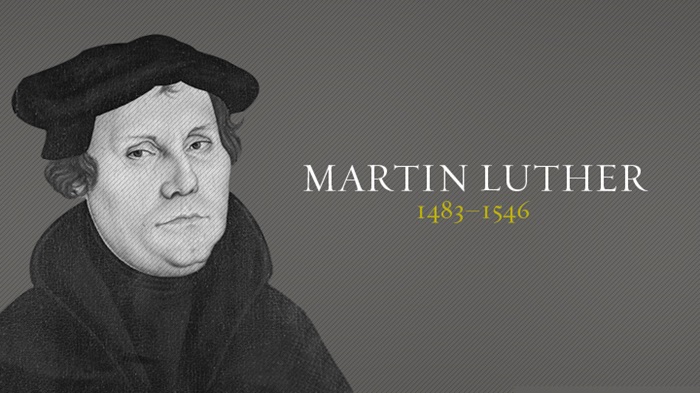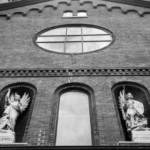…a gigantic blood sucking worm… insatiable corn weevil… devours piles of fruit surrounded by many fellow gluttons, who first suck out our blood and then consume our flesh, and now seek to grind our bones and devour all that is left of us,
the Germany reformer Ulrich von Hutten wrote in 1520, attacking the papacy, the Roman Catholic Church (187). Those Reformers were not kind in any shape or form toward the Roman church. I’ve been reading Eric Metaxas’ latest biography called Martin Luther: The Man Who Rediscovered God and Changed the World. I think the title is a bit much, but then again Metaxas is a bit much. Metaxas biographed William Wilberforce in Amazing Grace of the film fame, and Metaxas authored a popular biography on Dietrich Bonhoeffer. Metaxas is the celebrity biographer right now (just Google YouTube him – you’ll see Oprah written all over him). Metaxas appears to be a darling of the conservative Christian – so I like him. But since I look at such things as a scholar and a Reformed pastor, Metaxas is a bit much for me. I mean, I wouldn’t say Martin Luther singlehandedly changed the world. There were plenty of other Reformers before, during, and after Luther who did a lot to bring about the Protestant Reformation. Heck, the advent of the printing press alone made Luther a celebrity! Okay, enough – here’s how I took this Reformed theology tour during sabbatical.
I knew Laurie and I would be traveling to the epicenter of Catholicism, the Vatican. I knew I’d be inundated with all things Catholic. So I must have subconsciously sought out something to counterbalance this trip to the Vatican with some of my own roots, Calvinism. I bought and read (and listened to) Metaxas’ Luther. Sure enough, we arrived at St. Peter’s Basilica and it – is – spectacular. It’s bucket list phenom – an item for everyone in the world to visit. Why even attempt to describe it? Just go. But I tell you now: you will ask the most immediate glaring question: “Who the heck paid for all this?” The answer comes back ‘all of Europe in the early 1500s.’ Pope Leo X had Dominican friar Johannes Tetzel out pounding the pavement all over Germany (Luther’s home state) selling indulgences, who famously preached
As soon as a coin in the coffer rings / the soul from purgatory springs!
Yep, the Catholic church financed all that splendid art, church, and living by selling indulgences to German peasants who thought they could get their dead relatives out of limbo with money. But because of Luther Germany wasn’t buying it. People could see through it.
Here’s a fun indulgences tale… A nobleman goes to Tetzel and asks if it is feasible to buy an indulgence for a future sin. Focused only on the nobleman’s money, Tetzel says sure. So the nobleman buys the indulgence for a future sin. That night Tetzel makes his way to the next town but he’s waylaid and robbed. The robber is the nobleman. He explains, “This is the future sin I bought the indulgence for.”
Still, at that time Europe believed in the supreme power of the church to say who goes to hell and who doesn’t. The church and government were one. We just don’t get this today. Also, we don’t understand the late Medieval worldview. At that time people lived in a thoroughly enchanted world. All spirits, good and bad, were very real to them. The physical world was not so real to them. I know that sounds impossible, so you will just have to pull this mental trick on yourself to get it: just imagine that the material world is the spiritual world, and the spiritual world is the material world. Can you do this? It’s difficult. For them it was easy – spiritual was far more secure than the material world. Why? Life was hard. Life expectancy was short. The Plague showed up regularly every couple of years. And remember, nobody believed in germs until about 1885!!! The spirit world seemed more real than this flimsy thin brief material world.
Anyway, indulgences worked well until Luther posted his 95 Theses on the Wittenburg church door. The Theses condemned indulgences and said they were not scriptural. But, nobody had a Bible. Nobody read the Bible. Pope Leo X didn’t read the Bible (he just bought the papacy). Luther did because he was doctor of the church, a professor, a good Augustinian monk. And he was super bright. Luther’s Theses opened up criticism of the Catholic church. The Reformation asked questions: (a) what has ultimate authority? Pope or Bible? (b) how does someone get to heaven? Indulgences/works or grace from God? (c) do people need intermediaries between God and them or not? (priests) (d) What’s a sacrament? Magic or symbol?
As I mentioned yesterday, you can see the beginning here of the autonomous private individual. Salvation now could be “personal.” An individual can vote! A commoner can be elected to office. Anyone can preach. Common folk can handle the sacraments – bread and wine. People can now read for themselves. Everyone gets an education. People are judged by their peers. Science, technology, and education are the new means to a glorious future (“material” heaven).
I hang out with Benedictine monks. They are Catholic too. Lakeland has (ex??)Catholics. I like Catholics. I don’t see any of the abuses of Luther’s time with the Catholics I know. Still, I won’t become Catholic. I just don’t own the culture. While I like the “sacramental imagination” that the Americans crave so much (…and why do you like Star Wars, Lord of the Rings, and Harry Potter books/films?), it is actually that whiff of rigidity I am suspect of. Of course Protestantism has legalism too, and I don’t like that either.
Legalism doesn’t care what the Creed or the doctrinal statement says. Every Catholic I’ve met believes in salvation by grace alone. God saves us, we don’t work our way to heaven. And the Protestant legalists say the same exact thing. But then they have their “boundary markers.” You have to use the King James version of the Bible; cussing bad, PG-13 film is wrong, political parties are either good or bad, you’re either pro-military or pacifist… tattoos, kind of car you drive, homeschool, private or public school… you get the picture. No wonder legalists have to reduce salvation down to an isolated, hypothetical, theological, biblical belief statement. If salvation is only a mental construct, then that allows you have all kinds of legalistic, moralistic boundary markers, which are the REAL “who’s in and who’s out” signs of salvation. And just to throw secularists under a bus too, these days the politically correct ethos has a moral code you have to subscribe to or – you’re just not “loving.” Intolerance of intolerance is still stiff moralism.
The Reformation freed the church from crushing abuses, legalism, and a works-righteousness that was so dominate in the 16th century. Why does human nature like to return to this black and white legalism? It feels safe and it’s easy to understand. It tells adherents who’s a friend and who’s an enemy (tribalism). Also, rule-based faith allows the Christian to stay in control. Moralists don’t need a relationship with God. They have rules! As Dallas Willard phrased it, “We’ve become vampire Christians. We just want Jesus’ blood.” Because then we can create whatever other hoops to jump through that we want. Rules or cheap grace – they are both void of a divine relationship. This kills the Christian faith. And I think that is a lot of where American evangelicalism is at these days. I return to Lakeland keen on challenging this.
What if the way forward for evangelical Christians was to set aside all the stuff the Reformation worked so hard for?








